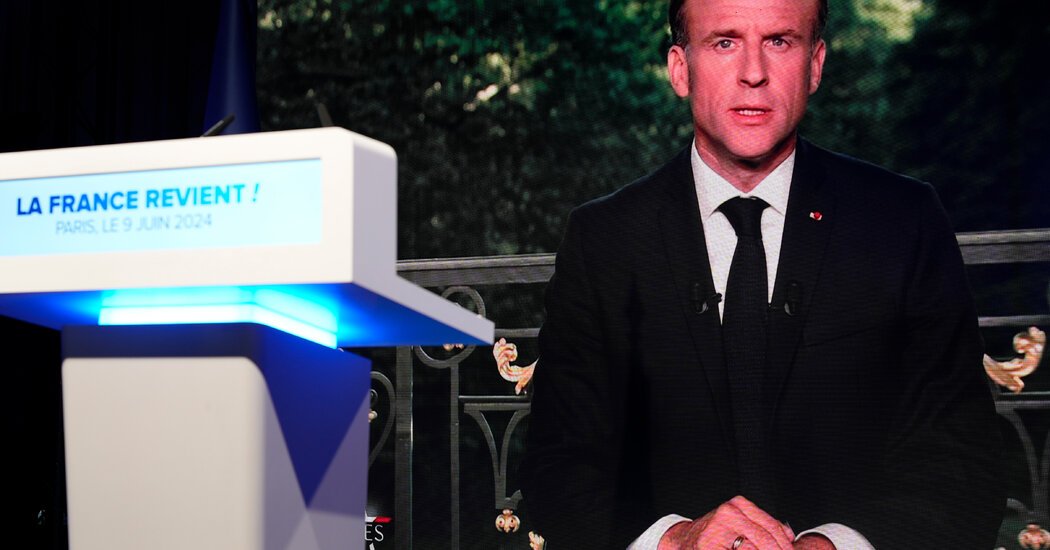France’s president calls for new elections after E.U. vote
President Emmanuel Macron of France, dealt a crushing defeat by the extreme right in European elections, dissolved the lower house of Parliament yesterday. He called for legislative elections beginning on June 30.
Macron’s decision was a measure of the devastating nature of the European Parliament election results. His centrist party was poised to finish with about half the support of Marine Le Pen’s far-right National Rally, which is set to become the leading French party.
“The rise of nationalists and demagogues is a danger for our nation and for Europe,” Macron said. “After this day I cannot go on as though nothing has happened.”
Early projections for the European Parliament elections, held by 27 countries in the E.U., appeared to show strong gains for several far-right parties. If confirmed, the results would amount to a powerful gauge of voter dissatisfaction and a stinging rebuke for the political mainstream. Here are live results.

“The move was not widely expected, and its fallout still unclear, so it’s a little hard to say definitively why Macron decided to make this move now,” my colleague Aurelien Breeden, who covers France, told me. “But his domestic agenda has been hobbled by a weak majority in the lower house of Parliament for the past two years, and the strong far-right showing appears to have convinced him that he could no longer proceed with business as usual.”
The right’s rise: Right-wing parties made gains as voters concentrated on nationalism and identity — themes often tied to migration and some culture-war politics. Lingering anger over Covid policies might have also played a role.
More on France: Macron’s decision comes weeks before the summer Olympic Games are set to begin in Paris in July and ushers in a period of deep political uncertainty in France.
In Germany: Alternative for Germany, a far-right party that was officially labeled a “suspected” extremist group by the country’s authorities, had a strong showing. Projected results would make it Germany’s second-ranking party.
Benny Gantz quits Israel’s government
The Israeli politician Benny Gantz, a key member of the war cabinet, quit the government yesterday over Prime Minister Benjamin Netanyahu’s handling of the war in Gaza. The move is unlikely to force Netanyahu from office, but Gantz’s moderate positions have helped boost the government’s international credibility.
Last month, Gantz threatened to resign unless Netanyahu worked to immediately answer major questions, including the return of hostages and the future governance of Gaza. Without Gantz’s party, the prime minister’s government will be made up of the right-wing Likud party, two far-right parties and two ultra-Orthodox factions. Analysts have said that Gantz’s departure could embolden far-right ministers in the coalition.
The war: Israel’s operation to rescue four hostages in central Gaza on Saturday unleashed a heavy aerial bombardment and ground operations that killed more than 200 people, according to two hospital officials in the area.
In Israel: Euphoria at the rescue quickly gave way to a harsh reality. Around 120 captives remain in Gaza, and Israelis fear that time is running out to save the hostages — about a quarter of them have already been declared dead by the Israeli authorities.
In central Gaza: Satellite imagery shows new tent cities rising as people who fled to Rafah moved yet again.
Modi begins a third term
A humbled Narendra Modi was sworn in yesterday for a third term as India’s prime minister. He is taking a more modest tone now that he has been forced into a coalition government and has lost his parliamentary majority.
He struck a conciliatory tone in a speech on Friday: “To run the government, a majority is necessary. But to run the nation, a consensus is necessary.” He has also publicly foregrounded his main coalition partners in events. But the question remains: Can Modi truly become a consensus builder, which he has not been during more than two decades in elected office?
How it happened: Here’s a map of where he gained and lost voters.
MORE TOP NEWS
Japan’s weak yen has drawn tourists to the country. But some Japanese residents are growing frustrated as popular sites in cities like Kyoto start to feel unmanageable and foreign visitors spill into places that were once unknown to tourists.
CONVERSATION STARTERS
-
The fuel for Ukraine’s soldiers: Troops are hooked on energy drinks. Many are marketed specifically to soldiers.
-
The translation market: With English fluency increasing in Europe, readers have started to buy American and British books in the original language. Publishers are worried.
-
Play our game: After years of renting in Dubai, a Frenchwoman decided to put down roots. Which home did she buy?
Cricket’s T20 World Cup
India beat Pakistan yesterday at the International Cricket Council’s men’s T20 World Cup, which was hosted on Long Island, outside New York City. India won by six runs: Batting first, it scored 119 to Pakistan’s 113.
Geopolitical tensions heightened the rivalry between the two cricketing nations, and viewership was set to be huge. Indeed, matches between the two countries are rare — they do not collaborate outside of I.C.C. events because of political hostility. More than 400 million people, more than three times the Super Bowl’s viewership this year, were expected to watch.
New York may have been a surprising choice of location. Indeed, the stadium was built just for the event and will be gone after the tournament. But the U.S. played host, along with the West Indies, to try to drive cricket’s growth in the U.S. Profits raised from the New York matches will go toward increasing awareness of the sport.
Background: Pakistan came off a shocking loss to the U.S. team. Some commentators called the upset one of the biggest in the sport’s history.










